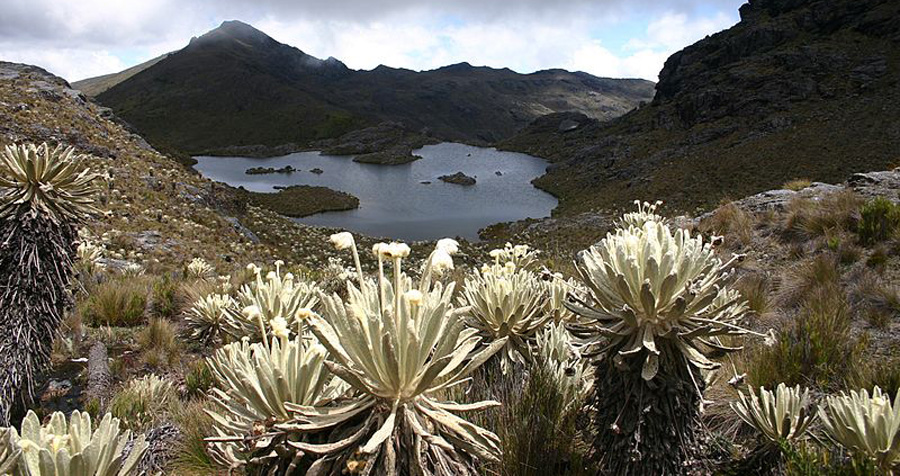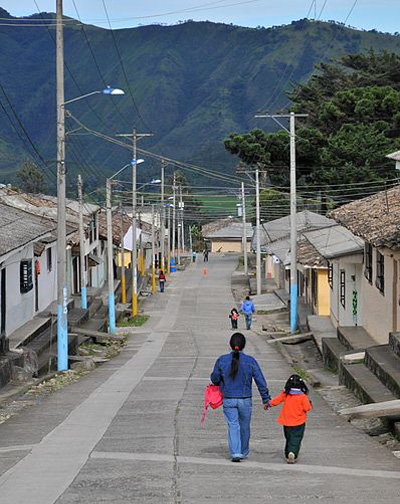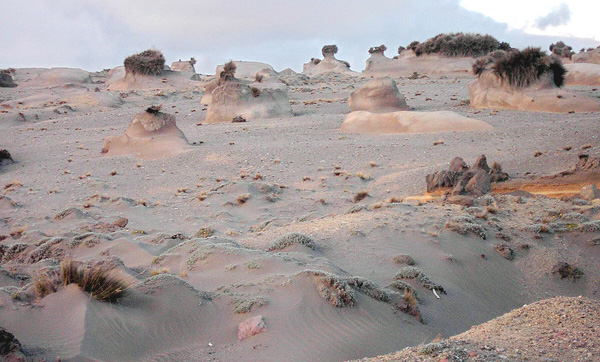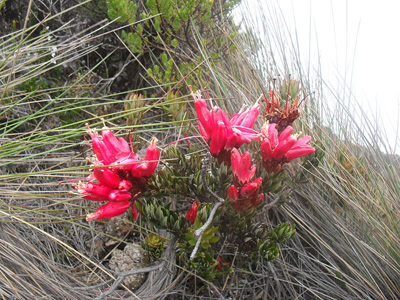From A World To Win News Service
Colombia: “Save the mountain wetlands! Save the planet!”
May 11, 2015 | Revolution Newspaper | revcom.us
4 May 2015. A World to Win News Service. Following is an abridged version of an article that appeared on the website of the Colombian Anti-Imperialist Brigades. The footnotes can be found on that site.

The paramo is a kind of mountain wetlands unique to the northern Andes, provides a major source of drinking water. Paramos are being threatened by global warming and an expanding agricultural. Above, Los Tunjos lake on the Paramo de Sumapaz, south of Bogota, Colombia, March 2006.
The paramo is a kind of mountain wetlands unique to the northern Andes. A decision by Colombia’s Ministry of the Environment has signed the paramo’s death warrant by authorizing large-scale mining in the northern reaches of the country’s eastern mountains.
In time-honoured bureaucratic jargon, the government claims that the giant mining companies will strive to avoid affecting “the ecosystemic services” provided by the paramo, as if the paramo were one of the sub-sub-sub contractors employed by officialdom or imperialist corporations.
The official decision is eclectic as well as hypocritical. It claims to recognize the importance of this crucial ecosystem, saying that it has taken into account that water from the paramo “benefits” more than 68 towns, including the city of Bucaramanga. It would be more accurate to say that more than 2.5 million people can’t live without its waters. On the one hand, the decision proclaims that its measures are intended to “improve the quality of life for the paramo’s inhabitants, equitable distribution of opportunities and the preservation of a healthy environment.” On the other, it emphasizes that “the Constitution protects private property, business and initiative”, “obliging the state to be fair and equitable” in relation to big business and its initiatives, and not just protect the small farmers and the miners who live in the paramo and depend on it for their livelihood.

More than 2.5 million people in this area of the high Andes can’t live without water from the paramos.
With a lot of rhetoric about “harmonizing” and “seeking balance” between these two sectors, and promises of “preventing” and “attenuating” “disturbances to the ecosystem,” the decision approves mineral rights concessions in the area. Above all, it gives carte blanche to big imperialist companies like Eco Oro (the notorious Canadian gold mining company formerly known as Greystar), AUX Colombia and Leyhat, among others. In confirming already existing titles to enormous tracts of land granted by the previous government, the state has chosen to ignore the negative experiences so far. For instance, as the decision itself admits, Eco Oro’s 850 drill holes (averaging more than 400 metres deep) have “often been badly managed, affecting the surrounding vegetation.”
Imperialist capital has shown a voracious appetite for the paramo. These ecosystems were formed over millions of years by means of a complex interaction between the evolution of a wide variety of plant and animal species and geological transformations, creating a diverse topology marked by mountain ranges, rivers and valleys. This is the world’s highest natural ecosystem. It gets stronger sunlight (due to the high altitude) and has a greater variety of plants than any other mountain ecosystem on Earth. It is a continuous source of very pure water, and by storing carbon dioxide it acts as a buffer against global warming. It is also a biological corridor for a wide variety of animal life.
The straw-like frailejon and giant senecio plants are highly adapted to the extreme climate, the cold and wind, strong solar radiation (due to the thinner atmosphere at high altitude) and humidity. Their thick trunks retain water. These plants are the main ground cover in the paramo, protecting many smaller plants and animals. This coverage also protects the soil, regulating the circulation of water, an extremely important feature of mountain wetlands in Africa and Oceania as well as Latin America. Not only does it limit the evaporation of rain water, it also retains water from the fog that covers much of this area most of the time. The vegetation structure captures water and leads it underground, keeping the soil from drying out and preventing erosion. The moistness of the high mountain soil is also due to the slow decomposition of organic matter because of the cold, and the specific characteristics of volcanic cinders. These soils can be considered “mineral peat bogs”. Black and deep, they are natural sponges that can hold as much as twice their weight in water, collecting all the rainfall during the winter months (up to 500 mm) and then releasing it slowly during the dry season. It could be said that every cubic meter of paramo “produces” a litre of water daily.
Mountain wetlands are the source of most of the drinking water for cities, irrigation water for food crops and hydroelectric power in the northern Andes, from north-east Peru to north-western Venezuela. For example, Bogota, with eight million inhabitants, gets 70 percent of its water from one single such wetland, called Chingaza.

Much of the land that used to grow crops has been sterilized or dried out by excessive use.
For many reasons, human activities (farming, mining, etc.) in these wetlands tend to be intensive and generally unsustainable. This was true to a lesser degree even before Columbus. The remnants of many forests have been cut down and the wetlands drained, leaving eroded pastures and barren crop land. Mining in mountain wetlands is bad for agriculture and livestock, though the wetlands’ chief importance is as a source of water and for biodiversity. By the early years of the 21st century about 30 percent of all the world’s mountain wetlands had been totally transformed or ruined. Another 40 percent have been negatively modified. Only about a third are still in natural conditions, mostly in inaccessible areas. A large part of the world’s surviving mountain wetlands are in Colombia, the source of the country’s hydraulic wealth some people brag about—or used to.
In the last few years the Santurbán Páramo, which used to extend over 142,000 hectares in the departments of Santander and Norte de Santander, has been repeatedly threatened by large-scale mining projects. Although small mines have existed here for centuries, these are mega-mines to be dug and operated by transnational companies. Mining associations have begun to proclaim that the paramo no longer exists and therefore can’t be defended.
The damage from mining will range from the destruction of the exceptional soil to the massive contamination of water bodies with cyanide (a poison used separate out minerals). Since these ecosystems are fragile, damage to one element can have a cascading effect. Santurbán is not the only páramo in danger—mountain wetlands all over the country are under attack. Right now 448 mining rights contracts have been awarded in 26 páramo areas. Rights to disregard environmental protection rules have been awarded in 347 cases already.
It’s not just the high wetlands that are at stake. We are facing an unprecedented global environmental emergency, whose consequences could be a climate change both irreversible and devastating. As the prominent climatologist James Hansen warns, our planet is nearing a tipping point, with temperature ranges that humanity has never before experienced. Once that point is crossed, the situation would be irreversible for many generations and many of the species of life on Earth would go extinct.
This environmental emergency is reaching enormous dimensions. Approximately half the world’s rain forests, concentrated along the equator, have been cut down for agriculture, wood and livestock raising. (Here in Colombia, every year 336,000 hectares of forest and native vegetation are cleared, an area equivalent in size to the country’s Atlantico department.) Much of the land that used to grow crops has been sterilized or dried out by excessive use, especially in the 40 percent of the world’s land surface that is arid or semi-arid. Globalization’s catastrophic effects on the environment have been most felt in the oppressed countries, but have been disproportionately caused by the imperialist countries. The big companies and governmental authorities know about the damage being caused, but they cannot escape the “expand or die” logic of capitalism.
Colombia’s economy, or in other words the whole network of its productive activities, is dominated by imperialism. Decisions about what is produced, how and for what are determined by the imperialist monopolies’ needs for profit extraction and not the needs of the country’s people. Under this system the Colombian economy is addicted to foreign capital investment and adjusts to its needs. For example, the state has set targets to double the amount of coal mined and quadruple gold mining, tripling the amount of land given over for mining leases. It has also given high priority to geological surveys “so that private enterprises can better assess the risk level of their investments.”
The Colombian state is part of the global capitalist-imperialist system, and so it has to respect that system’s rules of the game. The official national plan for development includes modifying legislation, making labour costs more “flexible” and giving out mining rights and permits for environmental damage, all to attract imperialist investment seeking profit opportunities. This state also uses the most vicious violence, through its legal armed forces and/or its illegal armed groups, to guarantee access to land for multinationals. This process of injecting foreign capital into the country also brings profits to the Colombian ruling classes, especially through state revenues and their participation in major projects as junior partners.
This is why it is an illusion to focus efforts on getting the state structure to implement reforms, vote for “good” candidates in elections, lobby for legislative reforms, etc. As long as this type of state exists it will guarantee the system’s functioning through both fooling people and repression. No one can reform a state that serves a system that can’t be reformed.

The ecosystems of the northern Andes were formed over millions of years creating the world’s highest natural ecosystem. The paramo has a greater variety of plants than any other mountain ecosystem on Earth.
We call on those who are seriously concerned by the destruction of the environment in the Santurbán mountain wetlands and who see the broader framework of the dangers brought by the global destruction of ecosystems; and those who feel a moral obligation to build resistance against the sacrifice of natural resources for the sake of the drive for profits: Follow your convictions that this rising and spreading resistance is right, don’t give up your decision to stop nature-destroying projects, no matter who is carrying them out. Don’t trade your principles for “intelligent” and “realistic” agreements with one or another section of the oppressors, and start looking for the underlying causes of this situation that has made you become active. Don’t back up when you find out that nothing but the truly revolutionary transformation of society, the overthrow of the capitalist-imperialist system, can change the direction this planet is heading in. Join together with the others who are now really working to take things in that direction so that together we can shoulder this tremendous task: we need a revolution, nothing less.
A World to Win News Service is put out by A World to Win magazine, a political and theoretical review inspired by the formation of the Revolutionary Internationalist Movement, the embryonic center of the world's Marxist-Leninist-Maoist parties and organizations.
Volunteers Needed... for revcom.us and Revolution
If you like this article, subscribe, donate to and sustain Revolution newspaper.






